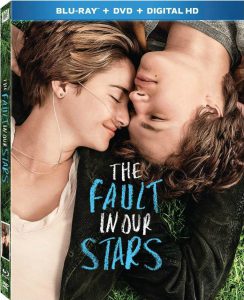Have the Kleenex ready for “The Fault in Our Stars,” a story about a teen stricken with the death sentence of cancer. Or have your stress pills ready. This movie, based on the popular young-adult novel by John Green and now available on DVD, has garnered its share of backlash from those who believe it romanticizes cancer.
Personally, I found “The Fault in Our Stars” to be a pitch-perfect tearjerker from the pen of Scott Neustadter and Michael H. Weber, who also gave us last year’s “The Spectacular Now.” That film, which also stars Shailene Woodley, is a more nuanced portrayal of the ups and downs of first love. “Fault” is all ups — except for the big downer of knowing you’re gonna die a horrible death at a young age — and that pushes it toward the realm of fantasy, and has opened the film up to criticism.
Ansel Elgort’s Gus always does and says exactly the right thing as he woos Woodley’s Hazel – or “Hazel Grace,” as Gus calls her in one of the couple’s cute little affectations. The film could’ve pulled a twist and revealed him to be an angel or a figment of Hazel’s imagination without having to shoot those early Hazel-Gus scenes any differently.
“Fault” also skims over the ugliness of cancer. Arguably, the film could’ve been improved a bit with more scenes of Hazel and Gus (who lost his lower right leg to cancer) vomiting or pissing the bed. Or the actors could’ve pulled a Tom Hanks in “Philadelphia” and really let themselves go. That would’ve made “Fault” a more honest cancer movie.
But I’d argue that “Fault” is an artistic take on the process of dying from cancer, and that it’s not necessarily a bad thing. Neustadter and Weber’s 2009 masterpiece “(500) Days of Summer” gave guys a story that reflected their own experiences of being rejected by the girl of their dreams. In reality, that girl does not look like Zooey Deschanel, but that doesn’t diminish the film’s message.
Filmgoers tend to think the deadly disease/condition genre should always operate differently from the Hollywood norm – that it should always be shot in a gritty, guerilla style with actors who let themselves go to hell. I disagree. I think a beautiful fantasy like “The Fault in Our Stars” (and “50/50,” and Kristina’s cancer arc on “Parenthood”) has value, too, and in showing a relationship that unfurls with a beautiful perfection, it is giving us something of artistic value.
Despite its stylized nature, there are loads of emotional truth in “Fault.” These teenagers are not saints because they have cancer. They are actually quite self-centered, just like all teens – Gus even leads a dry run of his own funeral, complete with eulogies.
But thinking of one’s self a lot is not the same as never thinking of other people. One of the most surprisingly powerful scenes in “Fault” comes when Hazel’s parents (Laura Dern and Sam Trammell) assure their daughter that they will not kill themselves after she dies, but rather that they intend to do some social work to help parents in similar situations. It totally makes Hazel’s day.

I love the consistent warmth of this movie, from Hazel’s loving parents to Gus letting his eye-cancer-stricken pal Isaac (Nat Wolff) smash Gus’ old basketball trophies to let out his frustrations. Woodley, as she proves in every movie, is one of the best actresses of her age, and one of the prettiest – even with chopped-off hair and permanent breathing tubes, her inner glow can’t be snuffed. Gus and Hazel’s private word being “OK” is a little silly, but the way Woodley emotionally chokes out “OK” after a long pause on the phone makes it work.
“The Fault in Our Stars” is romanticized, and it makes a horrible death from cancer into an epic, beautiful story that doesn’t – on its surface — resemble reality. But it’s also emotionally true right down to its core.

